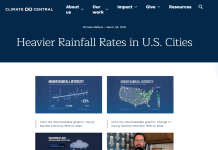Guest Post by Benny Peiser, Ph.D.
Editor’s Note: Banks and large stock portfolio investment management companies have been much in the news lately for their use of Environment, and Social, Governance (ESG) scores as a guide for their banking and investment recommendations, requirements, and decisions. The ESG movement is, at least in part, supposedly a response to the purported threat of climate change. As explored in dozens of articles on Heartland Daily News and at Stopping Socialism, ESG mandates and financial requirements are bad for the economy, won’t stop climate change, and are an assault on personal liberty. Banks, corporations, public sector investment funds, and stock fund managers should make their fiscal decisions based on the best available, verifiable, information concerning present and expected financial performance. In relation to the potential dangers of climate change, this means understanding the best available science. They are not. Their decisions are based on the projections of future disasters from climate models that are known to be flawed, rather than real-world data which indicate no climate catastrophe is in the offing. In this guest post Dr. Benny Peiser, director of the U.K.’s Global Warming Policy Foundation, discusses the Bank of England’s use of bad science to promote climate alarm, overstate climate costs, and how it is likely to undermine its customers’ best interests.
From Peiser’s analysis:
Net Zero Watch has called on the Bank of England to withdraw its latest climate stress test report as critics expose the bank’s use of false data and discredited scenarios.
Experts have criticized the Bank of England’s (BOE) climate stress test for adopting discredited projections of a global temperature change of 3.3C by 2050. [bold, links added]
This BOE projection far exceeds the IPCC’s SSP5-8.5 scenario – an extreme scenario which in itself is generally regarded to be extremely unlikely.
By using the most extreme and most unlikely scenario the Bank of England has grossly distorted the cost estimates for climate impacts in the next 30 years.
For Peiser’s full analysis, click here.

















Mar 13, 2022 Carbon tax only a small portion of ‘green debt’… and it does nothing for the environment
Why does the media refuse to connect green energy policies with the cost of living?
https://youtu.be/P7mdpwGIOzQ